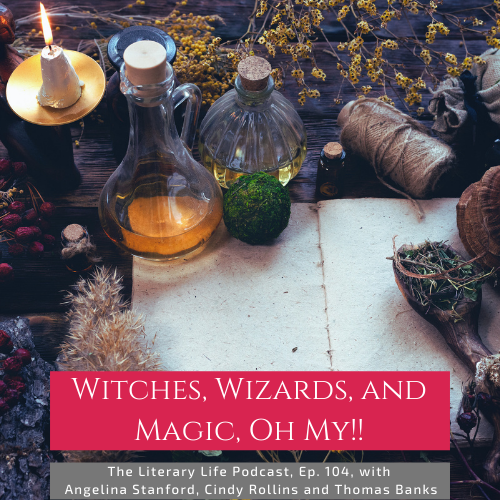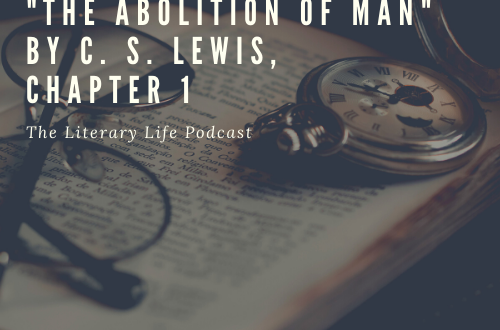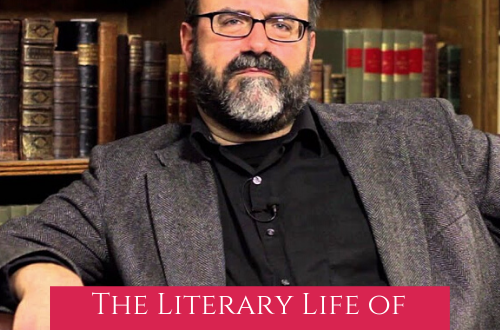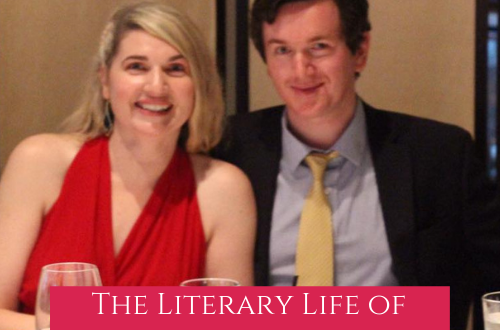
Episode 104: Witches, Wizards, and Magic, Oh My!!
Welcome to this week’s episode of The Literary Life Podcast! Today our hosts Angelina Stanford, Cindy Rollins and Thomas Banks tackle the tough questions so many people ask about reading stories dealing with magic. First off, Angelina affirms the need to discernment and the desire to steer clear of that which would be a stumbling block for our children. Cindy shares a little about her own concern when her children were very young. Then they set the groundwork by defining some terms and considering the kinds of questions we need to ask, beginning with Scripture and the church fathers. Be sure to listen to the end when Angelina, Cindy and Thomas suggest some criteria for evaluating magic elements in books before handing them to their students.
Come back next week when we will explore Robert Louis Stevenson’s The Strange Case of Dr. Jekyll and Mr. Hyde.
Don’t forget to check out our sister podcast, The Well Read Poem, as well as Cindy’s new podcast, The New Mason Jar!
Listen to The Literary Life:
Commonplace Quotes:
I am not conscious of having ever bought a book from a motive of ostentation.
Edward Gibbon
There is no language and no knowledge without symbol and metaphor. Two consequences arise from this: one is that we require imagination both to make and to interpret symbols, and the other is that symbols themselves beckon us through language to that which is beyond language. In other words, symbols are energized between the two poles (as Coleridge would say) of immanence and transcendence.
Malcolm Guite
Incidentally, we do not know of a single healthy and powerful book used to educate people (and that includes the Bible) in which such delicate matters do not actually appear to an even greater extent. Proper usage sees no evil here, but finds, as an attractive saying has it, a document of our hearts. Children can read the stars without fear, while others, so superstition has it, insult angels by doing the same thing.
Wilhelm Grimm
The Queen Mab Speech
by William Shakespeare
O, then I see Queen Mab hath been with you.
She is the fairies’ midwife, and she comes
In shape no bigger than an agate stone
On the forefinger of an alderman,
Drawn with a team of little atomies
Over men’s noses as they lie asleep;
Her wagon spokes made of long spinners’ legs,
The cover, of the wings of grasshoppers;
Her traces, of the smallest spider web;
Her collars, of the moonshine’s wat’ry beams;
Her whip, of cricket’s bone; the lash, of film;
Her wagoner, a small grey-coated gnat,
Not half so big as a round little worm
Pricked from the lazy finger of a maid;
Her chariot is an empty hazelnut,
Made by the joiner squirrel or old grub,
Time out o’ mind the fairies’ coachmakers.
And in this state she gallops night by night
Through lovers’ brains, and then they dream of love;
O’er courtiers’ knees, that dream on curtsies straight;
O’er lawyers’ fingers, who straight dream on fees;
O’er ladies’ lips, who straight on kisses dream,
Which oft the angry Mab with blisters plagues,
Because their breaths with sweetmeats tainted are.
Sometimes she gallops o’er a courtier’s nose,
And then dreams he of smelling out a suit;
And sometimes comes she with a tithe-pig’s tail
Tickling a parson’s nose as ‘a lies asleep,
Then dreams he of another benefice.
Sometimes she driveth o’er a soldier’s neck,
And then dreams he of cutting foreign throats,
Of breaches, ambuscades, Spanish blades,
Of healths five fathom deep; and then anon
Drums in his ear, at which he starts and wakes,
And being thus frighted, swears a prayer or two
And sleeps again. This is that very Mab
That plats the manes of horses in the night
And bakes the elflocks in foul sluttish hairs,
Which once untangled much misfortune bodes.
This is the hag, when maids lie on their backs,
That presses them and learns them first to bear,
Making them women of good carriage.
This is she!
Book List:
Memoirs of My Life by Edward Gibbon
Faith, Hope, and Poetry by Malcolm Guite
Wings and the Child by Edith Nesbit
Support The Literary Life:
Become a patron of The Literary Life podcast as part of the “Friends and Fellows Community” on Patreon, and get some amazing bonus content! Thanks for your support!
Connect with Us:
You can find Angelina and Thomas at HouseofHumaneLetters.com, on Instagram @angelinastanford, and on Facebook at https://www.facebook.com/ANGStanford/
Find Cindy at morningtimeformoms.com, on Instagram @cindyordoamoris and on Facebook at https://www.facebook.com/cindyrollins.net/. Check out Cindy’s own Patreon page also!
Follow The Literary Life on Instagram, and jump into our private Facebook group, The Literary Life Discussion Group, and let’s get the book talk going! http://bit.ly/literarylifeFB
Subscribe to The Lit Life:









7 Comments
Katie
I have to say a big thank you for this whole podcast. All my life I’ve been a reader. I learnt to read before I went to school and never stopped. Reading has been one of my longest passions. English literature was my favourite subject at school At university when I was burned out from four days of reading and two of essay writing a week for my subject, I just read L M Montgomery, Terry Pratchett and The Hobbit/LOTR on repeat for 3 years.
When I was exhausted and sleep-deprived with insomniac babies I raided the children’s section of my local library because I couldn’t read anything more challenging. Now my children are a bit older, I can read a wider variety of books and I manage about 100 a year. But nothing has ever made me want to rush out and read more than this podcast. Thank you! (And thanks for the introduction to Dorothy Sayers in particular.) My poor family suffer as I have a compulsion to narrate the podcasts to them, but I’m sure it’s good for them really, ha.
Ashley
I love Narnia and Tolkien’s world, and fairy tales. I’m a Christian and also believe in the reality of the spiritual realm, divided into the sides of God vs the opposing fallen angels.
It is interesting that in our day and modernist post-enlightenment understanding and defining of the word “witch”, J. K. Rowling picked that specific word for her characters and placed them in divination class where they literally practice divination, as repeatedly and regularly as a class would imply, and are still portrayed as the “good guys”.
That really doesn’t seem the same to me as the other stories you address. It also matches the exact definition you put forth of what would be biblically forbidden, so I have hard time understanding how it’s fairy tale magic in this particular case.
Perhaps the hp books treats divination nonchalantly and dismissively, in the same way our materialist culture treats divining rods, tarot cards, psychics, etc (how they treat Christianity, God and angels too) – laughs at them and shrugs at them – but do these things fit the the biblical definition of the forbidden?
I agree with you on many points, and the wonder of God’s creation is a beautiful thing and there is much more to his creation than what we can regularly see with our material senses, or narrowing our world to a materialist view.
That’s funny what you said about the forward direction of the music being bad in the case of the the played backwards tape – I think music does to the soul what would be considered on the magic or supernatural realm. Music is a powerful, awesome, wondrous instrument that can be used for great beauty, or great destruction.
One other thing which you haven’t mentioned yet is demonic possession, which would fall under the realm of magic/supernatural as well from a modern lense. Christians are to be filled with the Spirit, and pretenders cannot do miracles or “good magic”, whatever word is used. Seeking to do magic for your own or its own sake seems like it would fall either on the side of you shall not put your God to the test, or on the side of lusting for game, power, control, money for yourself and ending like Acts 19:11-16.
Interesting episode and topic and thanks for the conversation! I enjoy thinking over these things.
Ashley
Ok, hahaha I was laughing so much to myself at the I’m continuing that Acts story – perhaps the original book burners in Acts 19:17-20? I don’t know why that thought is so funny to me 😂
19-20 “A number who had practiced sorcery brought their scrolls together and burned them publicly. When they calculated the value of the scrolls, the total came to fifty thousand drachmas. In this way the word of the Lord spread widely and grew in power.”
“Sorcery” or “Magic” or “curious arts” depending on the translations I looked at in verse 19
So this was book burning that lead to the spread of Gospel, very interesting!
Lindsay B
I really recommend Michael D. O’brien’s book “A Landscape with Dragons” on this subject. It’s a thorough treatment and includes specific criteria for evaluating more recent books in this genre for suitability.
Pingback:
Pingback:
Alyssa Clevenger
How do you answer a child who asks, is this real? I think I answer the same way for all fiction–with a simple no. Is there a better way? Also, I would like to hear/read more about how C. S. Lewis thinks about technology.